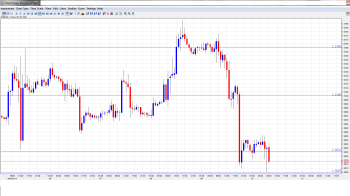EUR/USD volatility continues, as the pair changed direction on Thursday, posting sharp losses. The euro shed more than one cent, and was trading in the low-1.30 range in Friday’s European session. As for economic releases, this week has been unusually quiet, with only one key event – US Unemployment Claims, which was released on Thursday. The key weekly indicator continues to look sharp, and came in well below expectations. Today’s highlight is German Trade Balance, which was a disappointment, as it fell below the estimate. In the US, we’ll see figures for the Federal Budget Balance later on today.
Here is a quick update on the technical situation, indicators, and market sentiment that moves euro/dollar.
EUR/USD Technical
Asian session: Euro/dollar was fairly steady, touching a low of 1.3020 and consolidating at 1.3038. The pair is unchanged in the European session.
Current range: 1.3030 to 1.31.
Further levels in both directions:
<img alt=”EUR USD Daily Forecast May 9png” src=”https://www.forexcrunch.com/wp-content/uploads/2013/05/EUR-USD-Daily-Forecast-May-9png-350×196.png” width=”350″ height=”196″ />
<span class=”mceItemHidden”>&<span class=”mceItemHiddenSpellWord”>lt</span>;<span class=”mceItemHiddenSpellWord”>img</span> alt=”EUR USD Daily Forecast May 8png” <span class=”mceItemHiddenSpellWord”>src</span>=”https://www.forexcrunch.com/<span class=”mceItemHiddenSpellWord”>wp</span>-content/uploads/2013/05/EUR-USD-Daily-Forecast-May-8png-350×196.<span class=”mceItemHiddenSpellWord”>png</span>” width=”350″ height=”196″ /></span> <span class=”mceItemHidden”>&<span class=”mceItemHiddenSpellWord”>lt</span>;<span class=”mceItemHiddenSpellWord”>img</span> alt=”EUR USD Daily Forecast May 7″ <span class=”mceItemHiddenSpellWord”>src</span>=”https://www.forexcrunch.com/<span class=”mceItemHiddenSpellWord”>wp</span>-content/uploads/2013/05/EUR-USD-Daily-Forecast-May-7-350×196.<span class=”mceItemHiddenSpellWord”>png</span>” width=”350″ height=”196″ /></span> <span class=”mceItemHidden”>&<span class=”mceItemHiddenSpellWord”>lt</span>;<span class=”mceItemHiddenSpellWord”>img</span> alt=”EUR USD Daily Forecast May6″ <span class=”mceItemHiddenSpellWord”>src</span>=”https://www.forexcrunch.com/<span class=”mceItemHiddenSpellWord”>wp</span>-content/uploads/2013/05/EUR-USD-Daily-Forecast-May6-350×196.<span class=”mceItemHiddenSpellWord”>png</span>” width=”350″ height=”196″ /></span> <span class=”mceItemHidden”>&<span class=”mceItemHiddenSpellWord”>lt</span>;<span class=”mceItemHiddenSpellWord”>img</span> alt=”EUR USD Daily Forecast May3″ <span class=”mceItemHiddenSpellWord”>src</span>=”https://www.forexcrunch.com/<span class=”mceItemHiddenSpellWord”>wp</span>-content/uploads/2013/05/EUR-USD-Daily-Forecast-May3-350×196.<span class=”mceItemHiddenSpellWord”>png</span>” width=”350″ height=”196″ /></span> <span class=”mceItemHidden”>&<span class=”mceItemHiddenSpellWord”>lt</span>;<span class=”mceItemHiddenSpellWord”>img</span> alt=”EUR_USD Daily May2″ <span class=”mceItemHiddenSpellWord”>src</span>=”https://www.forexcrunch.com/<span class=”mceItemHiddenSpellWord”>wp</span>-content/uploads/2013/05/EUR_USD-Daily-May2-350×196.<span class=”mceItemHiddenSpellWord”>png</span>” width=”350″ height=”196″ /></span> <span class=”mceItemHidden”>&<span class=”mceItemHiddenSpellWord”>lt</span>;<span class=”mceItemHiddenSpellWord”>img</span> alt=”EUR_USD Daily May1″ <span class=”mceItemHiddenSpellWord”>src</span>=”https://www.forexcrunch.com/<span class=”mceItemHiddenSpellWord”>wp</span>-content/uploads/2013/05/EUR_USD-Daily-May1-350×196.<span class=”mceItemHiddenSpellWord”>png</span>” width=”350″ height=”196″ /></span>
Below: 1.3030, 1.3000, 1.2960, 1.2880, 1.2805, 1.2750 and 1.27.
Above: 1.31, 1.3160, 1.32, 1.3255, 1.3290, 1.3350 and 1.34.
The pair is testing support at 1.3030. 1.2960 is stronger. On the upside, 1.31 is providing resistance.
Euro sinks after strong US employment numbers – click on the graph to enlarge.
EUR/USD Fundamentals
6:00 German Trade Balance. Exp. 18.0B. Actual 17.6B.
8:00 Italian Industrial Production. Exp. -0.2%. Actual -0.8%.
Day 1: G7 Meetings. 12:25 US FOMC Member Charles Evans Speaks.
13:30 US Fed Chairman Bernanke Speaks. 18:00 US FOMC Member Esther George Speaks.
18:00 US Federal Budget Balance. Exp. 108.3B.
For more events and lines, see the Euro to dollar forecast
EUR/USD Sentiment
Wild ride for euro : It’s been a roller coaster ride for the euro over the past two days. On Wednesday, the continental currency jumped close to one cent, thanks to strong German manufacturing numbers. However, the euro coughed up these gains and then some the very next day, following solid US Unemployment Claims. With the ECB rate cut behind us, the markets will be expecting better numbers out of the Eurozone. If these expectations aren’t met soon, we could see the markets turn sour on the euro.German manufacturing numbers improve: German manufacturing data was on the right track this week, as Factory Orders jumped 2.2%, easily beating the estimate of -0.4%. On Thursday, there was more good news as Industrial Production climbed 1.2%, its best level since September . The markets were again way off the mark, as the estimate called for a -0.1% decline. This gave a strong, albeit brief boost to the euro. On Friday, the country’s trade surplus went up, but the markets were expecting a stronger reading. Germany, the locomotive of the Eurozone train, will need to post solid numbers if the Eurozone is to get back on its feet, and we can expect the euro to continue to react to German economic data.US employment picture brightens: There was only one major event this week, US Unemployment Claims. The key indicator looked sharp, pointing to 323 thousand new claims. This easily beat the estimate of 333 thousand. It was the third consecutive week that Unemployment Claims has beaten expectations. This is excellent news, but the markets will want to see strong numbers from other sectors of the economy to be convinced that the US is headed in the right direction.Will ECB take more action?: When the ECB cut rates last week to 0.50%, the euro initially move higher, but then dropped after ECB head Mario Draghi stated that the ECB would consider negative deposit rates. The reason? Such a move could lead to a flow of funds outside the Eurozone in search of better rates . On Monday, Draghi stated that ECB was open to lowering rates further, as well as cutting its deposit rates below zero. This time, talk of negative rates did not spook the markets, and the euro remained steady. However, if the markets feel that the ECB is leaning towards another rate cut, we could see more volatility from the euro.Greece gets good report card from IMF : Remember when Greece appeared to have one foot out of the Eurozone door? Well, things have certainly changed for the better since those tumultuous days. The IMF released a report this week which commended Greece for its efforts to reduce crippling deficits, noting “exceptional progress” in the past four years. The IMF also said that Greece had increased competitiveness and kept the financial sector stable. At the same time, the IMF noted that the country has failed to tackle tax evasion or cut the bloated public sector, and these factors had contributed to a deep recession. We are no longer hearing whispers of a Greek exit from the Eurozone, but the country may still need the helping hands of the IMF and the ECB until the economy shows further improvement.

